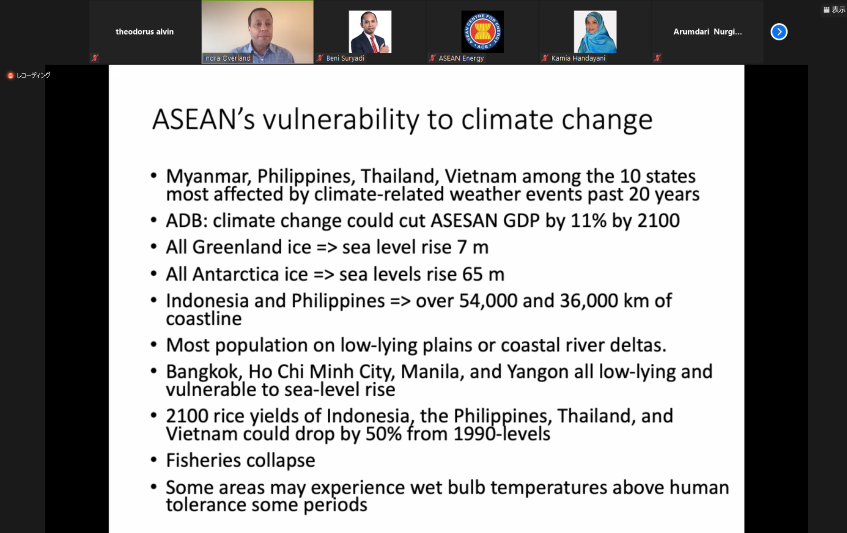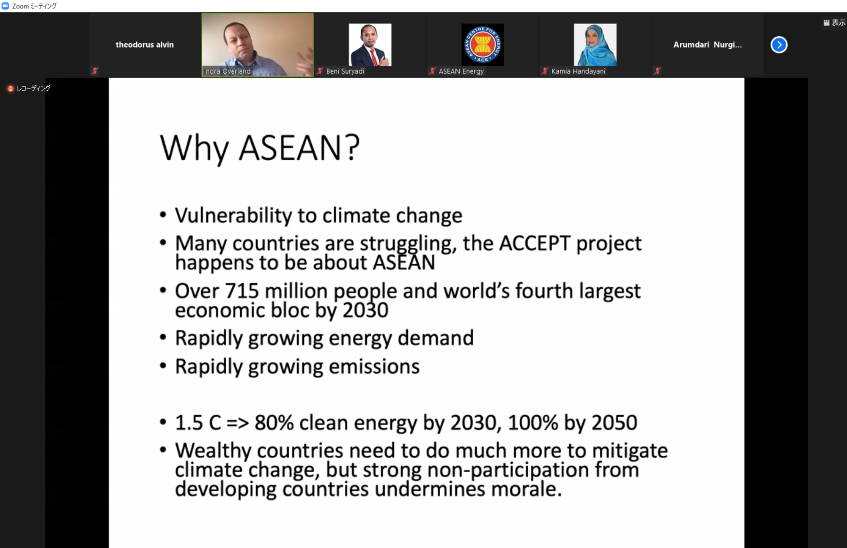Jakarta, 25 March 2021
The ASEAN Researchers Network on Energy and Climate Change (ARNECC) is a public group for researchers, analysts, scholars, students, and anyone with deep interests in topics related to energy and climate. It is one of the initiatives under the ASEAN Climate Change and Energy Project (ACCEPT), a collaborative effort between the ASEAN Centre for Energy (ACE) and Norwegian Institute of International Affairs (NUPI).

(Photo caption: Dr. Overland was explained about ASEAN’s Vulnerability to Climate Change in the presentation)
On Thursday, March 25th, 2021, ARNECC held its first paper talks, to discuss the academic paper written by prolific researchers on energy and climate subject that presented by Dr. Indra Overland from NUPI. His paper, entitled The ASEAN Climate and Energy Paradox, is open for public. Dr. Kamia Handayani, the guest researcher at the Department of Governance and Technology for Sustainability, University of Twente, was also present as the expert audience and lead moderator. The event marks the first paper talk which will be held routinely once a month in the future.
Climate change is a global issue, and generally, ASEAN Member States (AMS) are vulnerable. For example, as the population rises, there will be less rice that is produced by paddies because of slowly sinks number, especially in Indonesia, Vietnam, and the Philippines. Another part of ASEAN, especially Myanmar, Thailand, the Philippines, and Vietnam, experienced the heavy impact of extreme weather due to climate change. There are also possibilities of wet-bulb temperatures, above human tolerance which could be hazardous.
The Paris Agreement provided guidelines for fighting climate change globally. The developed countries, developing countries, underdeveloped countries are part of the Agreement, thus it serves as general guidelines and commitment towards fighting the rise of the temperature. Several states are ambitious and determined on submitting nationally determined contributions, others are not as determined. AMS are unambitious compared to other countries participating.
An effort made by AMS is relatively minimal in fighting climate change. The transportation sector is one of the main contributors to gas emission that leads to temperature rises and pollution as well. The electric vehicle is proposed to fight this issue since it produces no emission, consumes no fossil fuels, and relies on electricity produced by a battery that could be recharged.
Providing reliable mass transportation is also another method of reducing vehicle emission. It has been proven to be successful in the countries with such facilities for the public. In ASEAN, both methods are not on the states’ priority list. Private vehicles are congesting the road while public transportation remains secondary due to the lack of reliable services in several countries. On the other hand, fossil fuel subsidy is one factor that contributes to the stagnation of renewable energy development. Indonesia subsidises the most among other countries and the number is significantly higher in comparison. In 2017, AMS approximately spent 35 million USD for fossil fuel subsidies, but only 7 million USD for renewable energy.
Coal is the main contributor to climate change. Western countries are putting effort to reduce coal usage, but in ASEAN it is the opposite, coal consumption is growing at approximately 3% per annum. Coal consumption was supported by the increase in coal capacity facilities. Per 2017, there is 39,900 installed capacity across ASEAN, with Indonesia as the highest share. Indonesia is also the only country that does not require importing coal. Coal consumption is not going to disappear nor drop shortly, according to Dr. Overland. This further contributes to climate change, together with burning forests on Borneo.
According to Dr. Overland, for the AMS, transitioning toward sustainable resources is, by the book, easier compared to developed countries. That is because of the fact that developed countries already possess infrastructure built years ago. Replaced the discontinuity of its usage will disrupt and potentially disturb the current system. On the other hand, developing countries have not possessed those facilities and they could build them from scratches without disturbing the current system. Transitioning under such methods is more ideal, and AMS are in such a position. What needed is commitment and breakthrough to pursue.

(Photo caption: Dr. Overland was explained about Climate Change in ASEAN in the presentation)
Then, Dr. Handayani expressed her opinions on Dr. Overland’s paper. Some points were highlighted about the proposition of the paper, including the suggestion to emulating AMS in deploying large-scale solar development, and about Vietnam’s success in developing non-hydro power renewable energy by combining wind and biomass capacity.
At the end of the event, audience got chances to ask questions. One question asked about the issue of carbon pricing. European Union is leading the market of carbon pricing, in alliance with the United States. AMS are also encouraged to create a similar plan. In Indonesia, the government is devising regulations on carbon pricing, estimated to be ready in June 2021. Another question asked the topic of attracting investment on green energy. Dr. Overland said there is a need to spread knowledge on the importance of green and clean energy. Information on the danger of climate change should be massively disseminated by mass media. By making people aware of climate change, there will be more investments in green energy, which ultimately will enable 80% clean energy by 2020 and 100% by 2050.
Contact [email protected] to get featured on our next paper talks. Register at https://accept.aseanenergy.org/arnecc-form/ to join the community. Reach [email protected] for inquiries.
TA/HHS